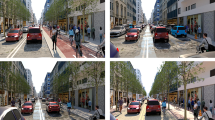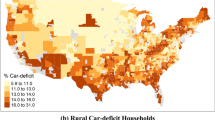Abstract
This article reviews empirical studies of how employer-paid parking affects employees' travel choices. A strong effect is found: parking subsidies greatly increase solo driving. When employers reduce or remove parking subsidies, a significant number of solo drivers shift to carpools and/or transit. This conclusion is based on studies of parking subsidies in a variety of circumstances, including central city and suburban areas, private and public employers, and clerical and professional employees. Three measures are developed to compare changes in commute patterns: changes in the share of solo drivers. changes in the number of autos driven to work per 100 employees, and the parking price elasticity of demand for solo driving. The studies reviewed here show that 19 to 81 percent fewer employees drive to work alone when they pay for their own parking. Because 90 percent of American commuters who drive to work receive employer-paid parking, these findings are significant for designing transportation policies to reduce air pollution, traffic congestion, and energy consumption.
Similar content being viewed by others
References
Anil Verma Associates (1986) Downtown Los Angeles Parking Price Survey. Community Redevelopment Agency, Los Angeles
Barton Aschman Associates Inc. (1986) Los Angeles Central Business District Employee Travel Bascline Survey, Final Report. Community Redevelopment Agency, Los Angeles
Center for Urban Transportation Research (1989) Factors Related to Transit Use. University of South Florida, Tampa
Charles River Associates Inc. (1984) Madison Peak-Period Parking Pricing Demonstration Project. U.S. Department of Transportation, Urban Mass Transit Administration, Washington D.C.
Commuter Transportation Services, Inc. (1985) The Benefits and Costs of Ridesharing to Employers: Survey Findings. Commuter Transportation Services, Inc., Los Angeles
—— (1988) 1988 Commuter Survey. Commuter Transportation Services, Inc., Los Angeles
Francis W & Groninga C (1969) The Effects of the subsidization of employee parking on human behavior. Unpublished research paper, School of Public Administration, University of Southern, CA
Gillen D (1977) Estimation and specification of the effects of parking costs on urban transport mode choice. Journal of Urban Economics 4: 186–199
Kenyon K (1984) Increasing Mode Split Through Parking Management: A Suburban Success Story. Transportation Research Record 980 (pp 65–69). Transportation Research Board, Washington D.C.
Mehranian M, Wachs M, Shoup D & Platkin R (1987) Parking Cost and Mode Choices Among Downtown Workers: A Case Study. Transportation Research Record 1130 (pp 1–5). Transportation Research Board, Washington D.C.
Miller G & Everett C (1982) Raising commuter parking prices — an empirical study. Transportation 11: 105–129
Miller G & Higgins T (1983) Implementing Parking Pricing Strategies. The Urban Institute, Washington D.C.
Olsson M & Miller G (1980) Parking Discounts and Carpool Formation in Seattle. The Urban Institute, Washington D.C.
Port Authority of New York and New Jersey (1984) 1984 Survey of Trans-Hudson Automobile Commuters. Port Authority of New York and New Jersey, New York, N.Y.
Shoup D & Pickrell D (1980) Free Parking as a Transportation Problem. U.S. Department of Transportation, Washington D.C.
Shoup D (1982) Cashing out free parking. Transportation Quarterly 36: 351–364
Soper C (1989) Pay parking for solo commuters: The 20th century solution. Unpublished paper, UCLA Extension Transportation Demand Management Program, UP No. X492, Los Angeles
Surber M, Shoup D, & Wachs M (1984) Effects of Ending Employer-Paid Parking for Solo Drivers. Transportation Research Record 957 (pp 67–71) Transportation Research Board, Washington D.C.
Transport Canada (1978) The Effects of the Imposition of Parking Charges on Urban Travel in Canada. Summary Report TP-291. Transport Canada, Ottawa
Wachs, M (1981) Pricing urban transportation: A critique of current policy. Journal of the American Planning Association 54: 509–520
Willson, R & Shoup D (1990) The Effects of Employer Paid Parking in Downtown Los Angeles. Southern California Association of Governments, Los Angeles
Author information
Authors and Affiliations
Rights and permissions
About this article
Cite this article
Willson, R.W., Shoup, D.C. Parking subsidies and travel choices: Assessing the evidence. Transportation 17, 141–157 (1990). https://doi.org/10.1007/BF02125333
Accepted:
Issue Date:
DOI: https://doi.org/10.1007/BF02125333




